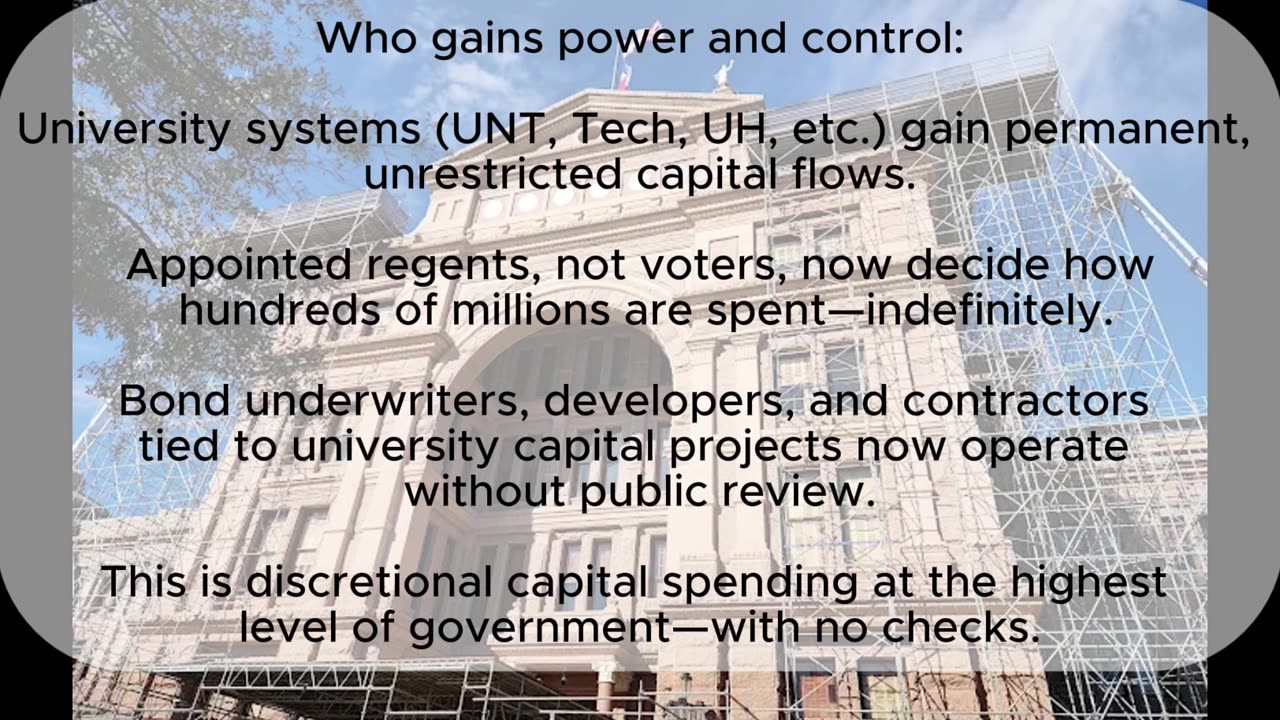Premium Only Content

"HB 42 looks like a win for public universities—but it quietly strips Texans of oversight over hundreds of millions in public funds.
This bill claims to increase funding for state universities that don’t get money from the Permanent University Fund. That sounds fair. Many campuses have aging buildings, overcrowded classrooms, and limited state support.
But behind the numbers, here’s what HB 42 really does:
It hands unelected university boards full control over nearly $600 million every year—with no audits, no legislative review, and no competitive bidding required. These boards now have “sole discretion” to spend constitutional funds however they choose, including using them to repay old construction debt, not build anything new.
Let that sink in: Public tax dollars are now flowing into bond repayment deals and private construction pipelines—with zero public say in how that money gets used.
Who benefits?
The lobbying trail is clear:
Texas Association of Manufacturers stood behind this bill. Why? They represent firms that supply building materials and benefit directly from big university contracts.
Dallas Regional Chamber and Opportunity Austin supported it. They know more capital projects mean more real estate growth and private contracting opportunities in their regions.
University systems like UNT, Texas Tech, and UH will now receive tens of millions more per year—with no public conditions on how it’s used.
These institutions gain power and money—while the public loses control and visibility.
Who loses?
Technical colleges like TSTC, which could be permanently removed from the fund if a related amendment passes.
Texas taxpayers, whose general revenue will now be tied up indefinitely to pay for capital debt.
Local vendors, who may be shut out of contract opportunities as boards bypass public bidding.
What happens next?
This bill sets the stage for more constitutional carveouts—where public funding can be redirected to institutions or regions without public input, performance benchmarks, or any oversight protections. Once this model is normalized, it can be applied elsewhere: healthcare, housing, infrastructure.
While I’m not a constitutional lawyer, this bill raises serious red flags to me as a citizen:
It delegates permanent spending authority to appointed boards with no accountability.
It opens a door to long-term fiscal commitments with no legislative flexibility.
It strips the public of its right to know, challenge, or redirect how constitutional dollars are used.
It effectively removes public capital from the hands of the people and hands it to institutions that don’t have to answer to us.
If you care about how your tax dollars are spent, who makes the decisions, and whether the public still has a voice—you should care about HB 42.
This isn’t just a higher ed funding bill. It’s a shift in who controls public resources—and whether Texans will be allowed to ask questions when the money disappears.
Stay alert. Follow the money. And don’t let policy move in the shadows."
-
 LIVE
LIVE
Barry Cunningham
2 hours agoPRESIDENT TRUMP HAS 2 INTERVIEWS | AND MORE PROOF THE GAME HAS CHANGED!
9,151 watching -
 1:20:27
1:20:27
Glenn Greenwald
4 hours agoLee Fang Answers Your Questions on Charlie Kirk Assassination Fallout; Hate Speech Crackdowns, and More; Plus: "Why Superhuman AI Would Kill Us All" With Author Nate Soares | SYSTEM UPDATE #518
49.4K19 -
 1:03:06
1:03:06
BonginoReport
4 hours agoLyin’ Jimmy Kimmel Faces The Music - Nightly Scroll w/ Hayley Caronia (Ep.137)
99.8K48 -
 55:40
55:40
Donald Trump Jr.
8 hours agoThe Warrior Ethos & America's Mission, Interview with Harpoon Ventures Founder Larsen Jensen | Triggered Ep275
49.7K51 -
 1:12:08
1:12:08
TheCrucible
4 hours agoThe Extravaganza! EP: 39 (9/18/25)
99.1K14 -
 1:21:41
1:21:41
Kim Iversen
6 hours agoNick Fuentes Denies Israel Killed Charlie Kirk | Right-Wing CANCELS Jimmy Kimmel
44.3K201 -
 1:01:59
1:01:59
Candace Show Podcast
4 hours agoEXCLUSIVE! Another Photo Of Tyler Robinson | Candace Ep 238
100K319 -
 2:21:09
2:21:09
Redacted News
5 hours agoWhat are they hiding? New video evidence in Charlie Kirk's Shooting SHAKES FBI'S case | Redacted
160K317 -
 41:53
41:53
Kimberly Guilfoyle
7 hours agoCharlie's Legacy and Our Mission
57.6K10 -
 1:07:55
1:07:55
vivafrei
7 hours agoJimmy Kimmel Out Indefinitely! Trump "Srubs" Study on Right Wing Violence? Clinton Tweet & MORE
222K88